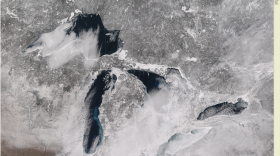-
Data from NOAA’s Great Lakes Environmental Research Laboratory show the Great Lakes are covered in ice. Here’s how much, what causes it, and some satellite photos of the coverage.
-
On Election Day, we learn about the history of Michigan’s original constitution. Then, some features from Interlochen Public Radio about a whitefish hotspot and H-2A worker wages. And two women share their journeys of infant loss and love.
-
First, an Episcopal Bishop on the role of faith in the wake of gun violence. Then, more on the discovery of the wreck of the SS Carruthers, the last of the "Big 8" shipwrecks to be found.
-
Representatives for Michigan State University’s largest union say recent layoffs are a violation of contract agreements. Then, how an Indigenous tribe is addressing whitefish’s decline. And, leaders from two smaller Michigan NPR affiliates discuss threats to federal funding that their stations need.
-
Whitefish populations in the lower Great Lakes have been declining for decades. Bridge Michigan environment reporter Kelly House joined Stateside to discuss what’s threatening the iconic fish, and what could be done to save them.
-
The Legislature debates a bill package around transgender youth in sports. Then, one person’s journey to become the first person to kayak around the Great Lakes. Plus, the impact of the EPA delaying setting guidelines for PFAS.
-
Today, a conversation with a man who has made it his life mission to keep the Great Lakes’ Indigenous language alive.
-
What climate change is doing to Michigan's allergy season, two scientists team up to find ways to help kids living with autism sharpen their social skills, and the Great Lakes sailing adventure that changed writer Jerry Dennis’ life.
-
Whitefish are on the brink of collapse in lakes Michigan and Huron. Their offspring are born on rocky reefs, where they're killed by sunburn, starvation, and predators. Scientists hope to save them by transferring eggs to rivers to teach whitefish to spawn away from danger.
-
Democrats aim to get Michigan's environmental agency more power over water quality issues, AI helps to uncover Great Lakes history, and reframing the Israel and Gaza conflict.
Play Live Radio
Next Up:
0:00
0:00
Available On Air Stations







